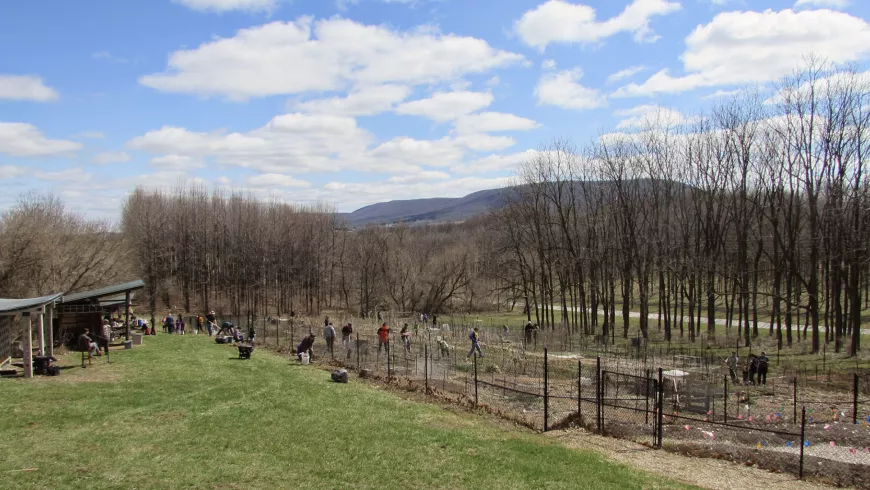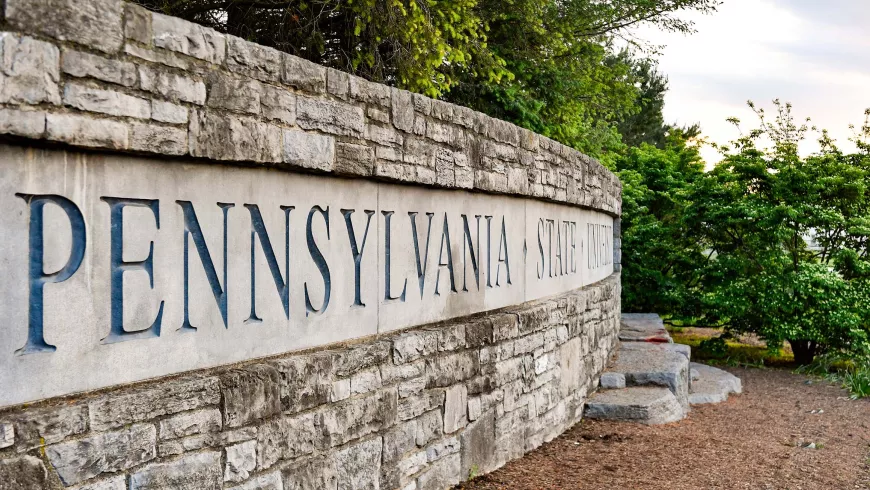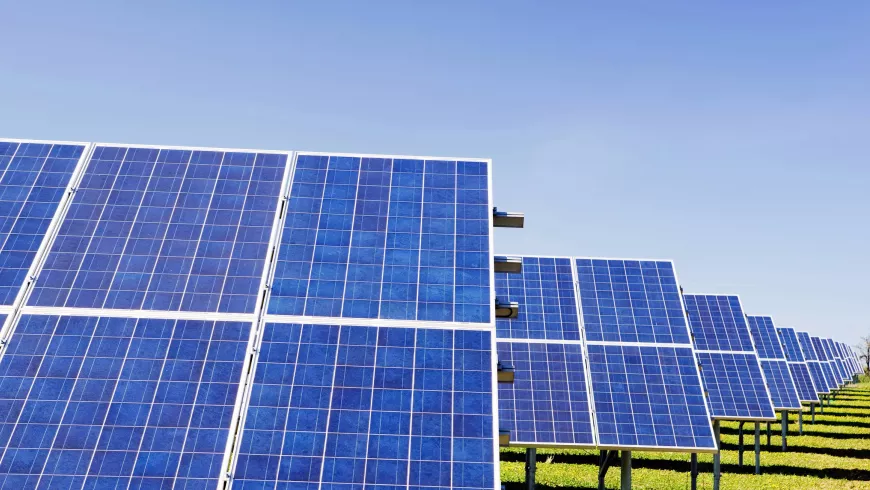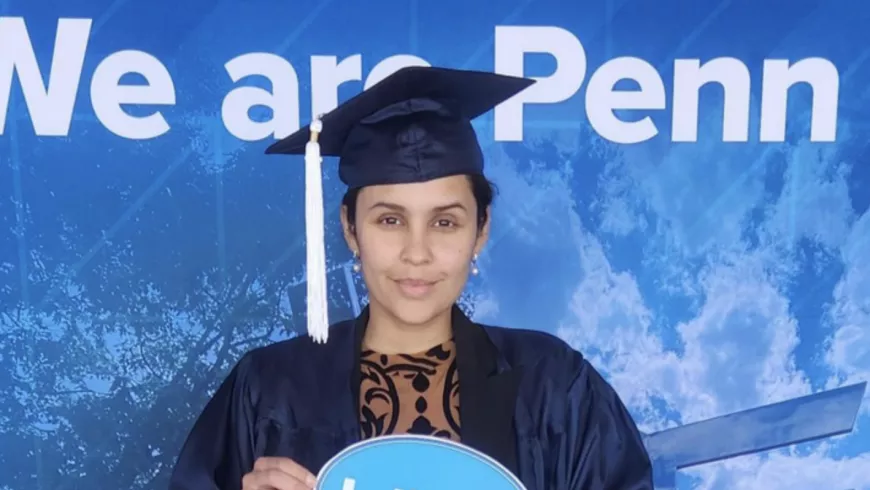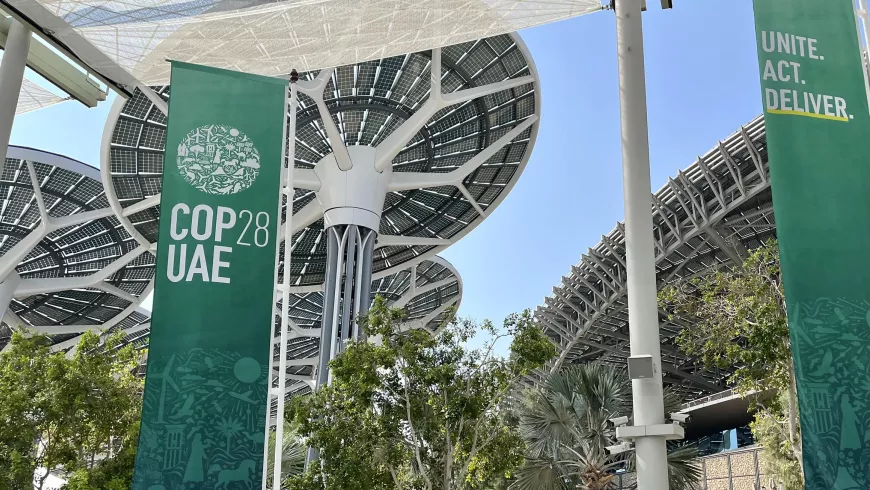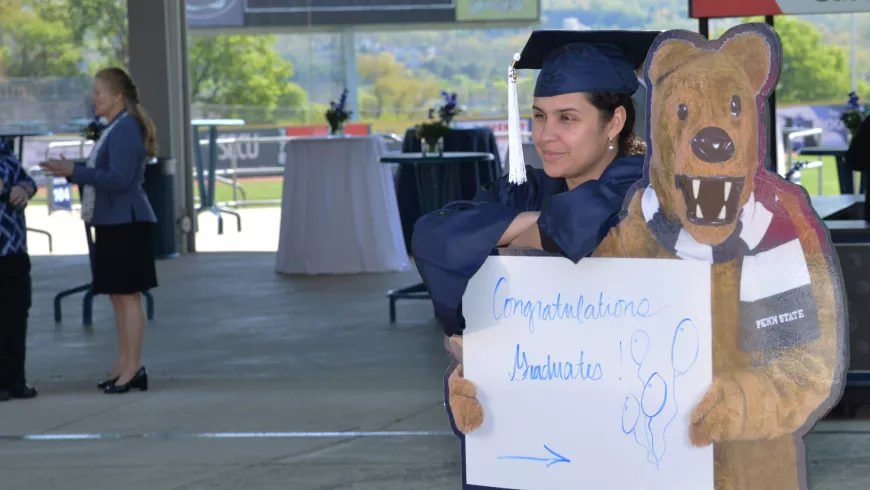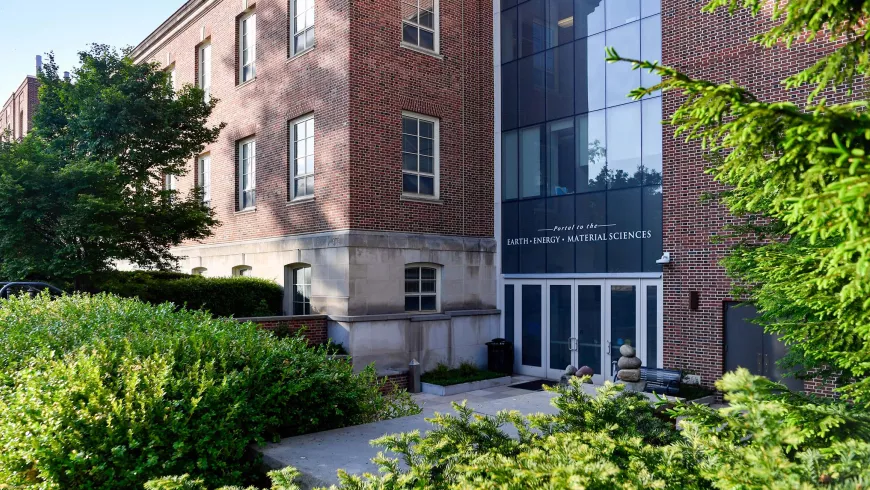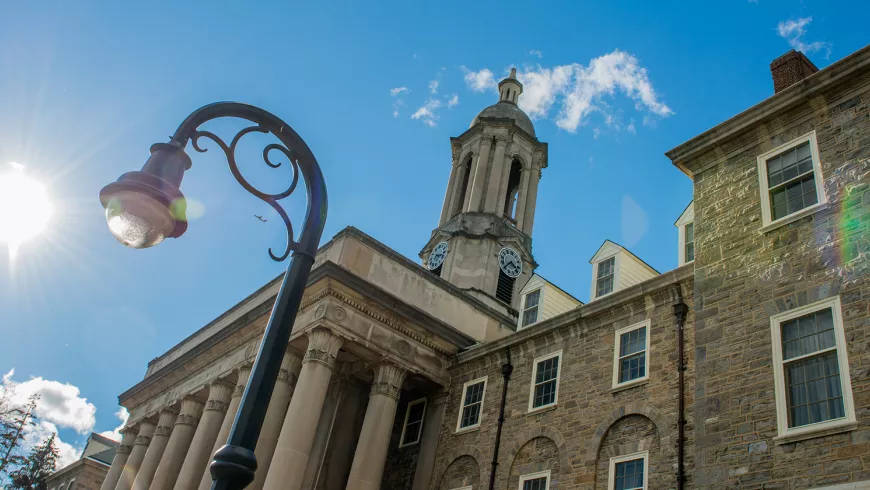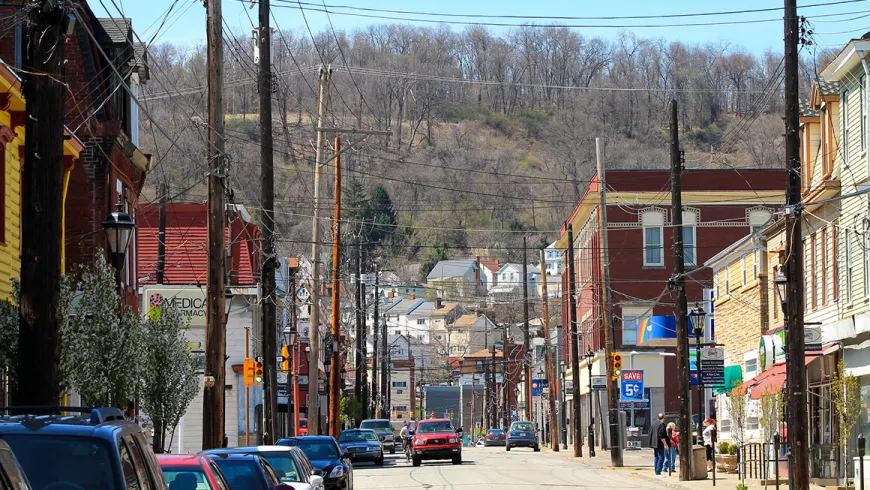Application deadline
Credits and costs
Nationally Recognized

Gain the Skills and Knowledge Needed to Achieve a More Sustainable Way of Life
Acquire technical knowledge of energy use (both conventional and renewable) and its environmental implications.
Develop strong collaboration skills to facilitate stakeholder interactions on matters related to energy, sustainability, and related policies.
Strengthen your global perspective through studies related to foreign languages and world cultures.
Act as an agent of change for stakeholders by facilitating communications, design, problem-solving, and planning.
Customize Your Course List
Customize Your Course List
The Bachelor of Arts in Energy and Sustainability Policy (ESP) is designed for online students with various education experiences and professional goals. The prescribed courses focus on:
- the energy industry and the domestic and global impact it has on the environment
- foreign and domestic policy
- corporate and community sustainability initiatives
Please note that some courses in the ESP program require students to maintain a web presence, which may include creating a web page, blog posting, video sharing, and other internet participation. ESP students may be required to participate in online activities that are widely accessible to the public, including audiences outside of the Penn State community.
The course list includes only courses offered by World Campus. An official degree audit or the recommended academic plan for this program may include additional course options and detailed requirements. All students are expected to complete at least 36 credits at Penn State to earn this degree. Please consult an academic adviser for details.
Prescribed Courses (62 credits)
- 3credits
Introduction to speech communication: formal speaking, group discussion, analysis and evaluation of messages.
- 3credits
Resource use decisions and their effect on local, national, and global development.
- C or better
A student enrolled in this course must receive a grade of C or better.
- 3credits
Methods of economic analysis and their use; price determination; theory of the firm; distribution.
- 3credits
National income measurement; aggregate economic models; money and income; policy problems.
- 3credits
Exposure to energy efficiency in day-to-day life to save money and energy, and thereby protect the environment.
- C or better
A student enrolled in this course must receive a grade of C or better.
- 3credits
Survey of the commercial development of the world petroleum industry from various international, historical, business, and cultural perspectives.
- 3credits
Energy is in transition, with increased international energy demand and increasing environmental pressures. Energy transitions, approaches, and outcomes are addressed.
- Prerequisite
EGEE 101 or EGEE 102 or CHEM 112
- 3credits
Industry perspective on the resources, technologies, engineering approaches, and externalities involved in satisfying worldwide energy demand profitably and sustainably.
- Prerequisite
ECON 104 and EGEE 102 and EGEE 120
- C or better
A student enrolled in this course must receive a grade of C or better.
- 3credits
Provides the culminating experience for Energy and Sustainability Policy majors through an individualized inquiry-based capstone project in which students tackle the wicked problems of sustainability they see and experience in their own communities.
- Prerequisite
To be taken only after all other courses have been successfully completed
- C or better
A student enrolled in this course must receive a grade of C or better.
- 3credits
Critical evaluation of selected media (e.g., books, film) in contemporary culture on topics related to energy and sustainability.
- 1credit
Orientation to goals of the Energy and Sustainability Policy program and resources available to help students succeed.
- C or better
A student enrolled in this course must receive a grade of C or better.
- 3credits
Instruction and practice in writing expository prose that shows sensitivity to audience and purpose.
- GWS
The credits earned in this course may be applied toward the Writing/Speaking (GWS) requirement.
- 3credits
Writing reports and other common forms of business communication.
- Prerequisite
(ENGL 15 or ENGL 30) and fourth-semester standing
- GWS
The credits earned in this course may be applied toward the Writing/Speaking (GWS) requirement.
- 3credits
Introduction to the relationships between humans and the natural environment, in addition to the theories and methods that geographers employ in addressing them.
- C or better
A student enrolled in this course must receive a grade of C or better.
- 3credits
Analysis, formulation, implementation, and impacts of energy-related policies, regulations, and initiatives.
- Prerequisite
EBF 200 and EGEE 120 and PLSC 490
- C or better
A student enrolled in this course must receive a grade of C or better.
- or:3credits
Analysis, formulation, implementation, and impacts of energy-related policies, regulations, and initiatives.
- Prerequisite
EBF 200 and EGEE 120 and PLSC 490
- C or better
A student enrolled in this course must receive a grade of C or better.
- 3credits
Human dimensions of global environmental change: human causes; human adaptations; and policy implications of global warming.
- Prerequisite
(EARTH 2 or GEOG 10 or METEO 3) and GEOG 30N
- C or better
A student enrolled in this course must receive a grade of C or better.
- 3credits
Examination of global warming and climate change: the basic science, projects, impacts, and approaches to mitigation.
- Prerequisite
STAT 200 or MATH 110 or MATH 140
- C or better
A student enrolled in this course must receive a grade of C or better.
- 3credits
This course examines the American democracy by looking at the dynamic interaction between the founding ideals of the United States government, the institutions established by the Constitution, and the ongoing contest for power within and through those institutions.
- 3credits
Advanced analysis of public policy, emphasizing policy evaluation and the factors that determine policy success and failure.
- Prerequisite
(PLSC 1 and PLSC 2) or PUBPL 304W
- C or better
A student enrolled in this course must receive a grade of C or better.
- 4credits
Descriptive Statistics, frequency distributions, probability and normal distributions, statistical inference, linear regression, and correlation.
- Prerequisite
Placement into MATH 21 or higher.
- C or better
A student enrolled in this course must receive a grade of C or better.
Additional Courses (select 6 credits)
- 3credits
Nontechnical treatment of fundamentals of modern meteorology and the effects of weather and climate.
- 3credits
Courses offered in foreign countries by individual or group instruction.
- or:3credits
Supervised off-campus, nongroup instruction including field experiences, practica, or internships. Written and oral critique of activity required.
Engaged Scholarship: Internships and Foreign Studies
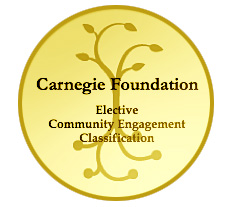
Penn State was selected by the Carnegie Foundation for its 2015 Community Engagement Classification, an honor resulting from our commitment to providing students with at least one outside-the-classroom engagement opportunity that impacts our community. Every student in the ESP program takes part in this type of international study experience (EGEE 299) or domestic internship (EGEE 495). You will work with faculty to design a meaningful opportunity that complements your professional aspirations and busy schedule.
Electives (select 8 credits)
8 credits chosen in consultation with an adviser.
Bachelor of Arts Degree Requirements
Some Bachelor of Arts requirements may be satisfied by courses required for the major, General Education courses, or electives. Students should work with an adviser to select courses.
- Foreign Language: 0–12 credits
Students must attain 12th credit level of proficiency in one foreign language. - B.A. Fields: 9 credits
Humanities, Social and Behavioral Sciences, Arts, Foreign Languages, Natural Sciences, Quantification (cannot be taken in the area of the student's primary major; foreign language credits in this category must be in a second foreign language or beyond the 12th credit level of proficiency in the first language) - Other Cultures: 0–3 credits
Select 3 credits from approved list. Students may count courses in this category in order to meet other major, minor, elective, or General Education requirements, except for the General Education US/IL requirement.
General Education Requirements
Some General Education requirements may be satisfied by courses required for the major. Students should work with an adviser to select courses.
- Foundations: 15 credits
All courses require a grade of C or better. Inter-Domain courses may not be used for foundations requirements.- Writing/Speaking: 9 credits
- Quantification: 6 credits
3-6 credits are selected from mathematics, applied mathematics, and statistics; 3 credits may be selected from computer science or symbolic logic.
- Knowledge Domains: 15 credits
Inter-Domain courses may not be used for knowledge domain requirements.- Health and Wellness (GHW): 3 credits
- Natural Sciences (GN): 3 credits
- Arts (GA): 3 credits
- Humanities (GH): 3 credits
- Social and Behavioral Sciences (GS): 3 credits
- Integrative Studies: 6 credits
- Inter-Domain course work: 6 credits
- Exploration: 9 credits
- Natural Sciences (GN) (may be Inter-Domain): 3 credits
- GA, GH, GN, GS, and Inter-Domain courses: 6 credits
May include 3 credits of World Language course work beyond the requirements of the student’s degree program or at the 12th credit level, whichever is higher.
These General Education Requirements are for students who started in summer 2023 or later. Students who started earlier can review the prior version of the general education requirements.
Course Availability
If you're ready to see when your courses will be offered, visit our public LionPATH course search (opens in new window) to start planning ahead.
A Career in Sustainability

A Career in Sustainability
Within the past decade, new career opportunities have emerged as we have witnessed a worldwide power shift toward a more sustainable future. With a sustainability degree and the support of Penn State career services, you can be well prepared for career advancement in this growing field.
Job Titles Related to This Degree
The following roles are often held by people with this type of degree:
- Environmental Analyst
- Environmental Programs Specialist
- Environmental Protection Specialist
- Natural Resource Manager
- Resource Conservation Specialist
Employment Outlook for Occupational Fields Related to This Degree
Estimates of employment growth and total employment are provided by the U.S. Bureau of Labor Statistics and are subject to change. While these occupations are often pursued by graduates with this degree, individual outcomes may vary depending on a variety of factors. Penn State World Campus cannot guarantee employment in a given occupation.
Compliance Officers
Environmental Scientists and Specialists, Including Health
Conservation Scientists
Career Services to Set You Up for Success

From the day you're accepted as a student, you can access resources and tools provided by Penn State World Campus Career Services to further your career. These resources are beneficial whether you're searching for a job or advancing in an established career.
- Opportunities to connect with employers
- Career counselor/coach support
- Occupation and salary information
- Internships
- Graduate school resources
Ready to Learn More?
Get the resources you need to make informed decisions about your education. Request information on this program and other programs of interest by completing this form.
Ready to take the next step toward your Penn State bachelor's degree?
Costs and Financial Aid
Costs and Financial Aid
Learn about this program's tuition, fees, scholarship opportunities, grants, payment options, and military benefits.
Costs and Financial Aid
Undergraduate Tuition
Undergraduate tuition is calculated based on the number of credits for which you register and the number of total credits you have accrued at or transferred to Penn State.
Tuition is due shortly after each semester begins and rates are assessed every semester of enrollment.
2024–25 Academic Year Rates
| How many credits do you plan to take per semester? | If you have 59 or fewer credits | If you have 60 or more credits |
|---|---|---|
| 11 or fewer | $632 per credit | $678 per credit |
| 12–19 | $7,678 per semester | $8,288 per semester |
2025–26 Academic Year Rates
| How many credits do you plan to take per semester? | If you have 59 or fewer credits | If you have 60 or more credits |
|---|---|---|
| 11 or fewer | $638 per credit | $685 per credit |
| 12–19 | $7,755 per semester | $8,371 per semester |
Undergraduate students taking more than 19 credits will be charged the flat tuition rate plus the regular per credit hour rate for each credit above 19.
Financial Aid and Military Benefits
Some students may qualify for financial aid. Take the time to research financial aid, scholarships, and payment options as you prepare to apply. Federal financial aid may only be used to pay for credits used to satisfy program requirements.
Military service members, veterans, and their spouses or dependents should explore these potential military education benefits and financial aid opportunities, as well.
Additional Cost of Attendance Details
To view the detailed list of cost of attendance elements:
- visit the Tuition Information site
- click the plus sign to expand the table
- select a semester from the World Campus row
Military Grant-in-Aid Benefits for ESP Students
The Military Grant-in-Aid is an undergraduate program that brings our tuition rate closer to the Department of Defense cap, making a Penn State World Campus–quality education more affordable to our military students and spouses. More details, including Grant-in-Aid forms, can be found on the Military Grants and Scholarships page.
A Degree to Meet Your Needs: B.S. or B.A.
A Degree to Meet Your Needs: B.S. or B.A.
This interdisciplinary program integrates course work in energy security, environmental science, sustainability management, foreign and domestic energy, and sustainability policy analysis.
The Bachelor of Arts and Bachelor of Science in Energy and Sustainability Policy are both 120-credit programs, with the same General Education requirements and the same prescribed course work. In the B.S. program, students select additional course work in areas closely related to the major. In the B.A. program, the focus is expanded to allow students to select a foreign language and take supporting course work in global culture and humanities. In choosing which program best meets individual needs, students are encouraged to consider personal interests and strengths, professional aspirations, and plans for graduate school. For those with prior learning experience, the applicability of earlier course work to degree requirements may also be a consideration.
Gain an International Perspective
In addition to instilling a strong sustainability ethic, this online degree program integrates an international perspective, so you can gain knowledge of social, cultural, and political dimensions of energy and sustainability considerations on a global scale.
Set Your Own Pace

Set Your Own Pace
Whether you are looking to finish your program as quickly as possible or balance your studies with your busy life, Penn State World Campus can help you achieve your education goals. Many students take one or two courses per semester.
Our online courses typically follow a 12- to 15-week semester cycle, and there are three semesters per year (spring, summer, and fall). If you plan to take a heavy course load, you should expect your course work to be your primary focus and discuss your schedule with your academic adviser.
To Finish Your Degree in Two to Three Years
- Take 6 courses each semester
To Finish Your Degree in Three to Four Years
- Take 4–5 courses each semester
To Finish Your Degree in Five or More Years
- Take 2–3 courses each semester
Timelines may vary for students transferring credits from another school or based on course availability.
Convenient Online Format
This program's convenient online format gives you the flexibility you need to study around your busy schedule. You can skip the lengthy commute without sacrificing the quality of your education and prepare yourself for more rewarding career opportunities without leaving your home.
A Trusted Leader in Online Education

Penn State has a history of more than 100 years of distance education, and World Campus has been a leader in online learning for more than two decades. Our online learning environment offers the same quality education that our students experience on campus.
Information for Military and Veterans

Are you a member of the military, a veteran, or a military spouse? Please visit our military website for additional information regarding financial aid, transfer credits, and application instructions.
How to Apply to Penn State

How to Apply to Penn State
Apply by June 30 to start August 25
Application Instructions
Deadlines and Important Dates
Complete your application and submit all required materials by the appropriate deadline. Your deadline will depend on the semester you plan to start your courses.
Fall Deadline
Apply by June 30 to start August 25Spring Deadline
Apply by October 31 to start January 12Summer Deadline
Apply by March 15, 2026, to start May 18, 2026
New students are encouraged to complete the FAFSA by March 1. Please visit the Office of Student Aid website for more information about applying for financial aid and recommended deadlines.
Steps to Apply
To apply for this program, you must be a high school graduate, or have completed your GED.
You will need the following items to complete your application:
High school transcripts or GED transcript — First-year applicants are required to submit Self-Reported Academic Records (SRAR) when applying. Official high school transcripts for first-year applicants will only be required at the time a student accepts an offer of admission to Penn State.
Transfer international students will need to submit their high school transcript before their application can be reviewed.
Official college or university transcripts and/or official military transcripts (if applicable) — All college or university transcripts are required regardless of the length of time that has passed, the grades earned, or the accreditation of the institutions attended. Acceptance of transfer credit toward your degree is subject to final approval by the academic department. For detailed information, see the Transfer Students page.
Transcripts not in English must be accompanied by a certified translation.
English Proficiency — The language of instruction at Penn State is English. With some exceptions, international applicants must take and submit scores for the Test of English as a Foreign Language (TOEFL) or International English Language Testing System (IELTS). Minimum test scores and exceptions are found in the English Language Proficiency section on the Undergraduate Admissions International Requirements page. Visit the TOEFL website for testing information. Penn State's institutional code is 2660.
To begin the online application, you will need a Penn State account.
Create a New Penn State Account
If you have any problems during this process, contact an admissions counselor at [email protected].
Please note: Former Penn State students may not need to complete the admissions application or create a new Penn State account. Please visit our Returning Students page for instructions.
Accessing MyPennState
The MyPennState Portal provides access to our online admissions services. Before accessing MyPennState, you must have a Penn State account that will be used to access all Penn State systems. After creating an account, you will receive a unique Penn State User ID. You will need to enter your User ID followed by @psu.edu when signing in to MyPennState and other Penn State sites. For example, you should be entering something like '[email protected]' in the Sign In field.
The application consists of six sections:
- Application Setup
- Program of Study
- Citizenship and Residency
- Academics and Experience
- Miscellaneous
- Review and Submit
Application Setup
Be sure to select "Online" for the "How would you like to complete your degree" question if you plan to attend Penn State World Campus.
The rest of this section will ask some basic questions about your education experience and military affiliation.
Program of Study
You will choose the degree type and then the starting semester.
Your starting campus will be selected as Penn State World Campus by default as long as you picked "Online" in your Application Setup. Click Continue.
On the Choose a Program page, select your intended major from the list.
Review your selection on the summary screen and click Continue to move on to the Citizenship and Residency section.
Citizenship and Residency
Complete the series of questions about your citizenship status, demographic information, Pennsylvania residency status, and family history.
Academics and Experience
You will need to enter academic experience information about your high school and any attempted courses at a college or university after high school.
The Education Gap Statement offers a place to explain any time that has elapsed between your high school graduation and your anticipated enrollment at Penn State. Please provide a summary of why that gap occurred. Some examples that would explain a gap in your education include work, family, attending another college or university, etc.
Miscellaneous
In the Miscellaneous section, you will provide any program-specific requirements (e.g., a personal statement), information about activities, and financial aid information.
Review and Submit
Review your information, digitally sign your application, and provide payment for the application fee ($65 domestic or $75 international).
High School Transcripts and Academic Record
After your application is completed, you will also need to self-report your high school course work before the application deadline. You will be directed to fill out the Self-Reported Academic Record (SRAR). It is helpful to have a high school transcript available when completing this section. In the third section, you'll select your program of study and campus.
Official high school transcripts or GED transcript, along with records from high school, are required, regardless of the length of time that has passed.
Include any college/university transcripts (required), military transcripts, and Proof of English Language proficiency (if applicable). SAT/ACT scores are not required if you are identified as an adult learner or transfer student.
All official documents should be sent to:
Undergraduate Admissions Office
The Pennsylvania State University
201 Shields Building
University Park, PA 16802You can also have your transcripts sent electronically through Parchment, eScript-Safe, or the National Clearinghouse directly to Penn State from the college/university where course work was attempted.
Acceptance
After receiving your application, application fee, and all required materials, your application will be evaluated for admission. You can check your application status online. This will provide the most up‐to‐date information about the status of your application and is updated once daily, before 8:00 a.m. (ET). Once a decision has been made regarding your application, it will be available to you through the MyPennState portal.
For information on when you can expect an admissions decision, visit the Dates and Deadlines page of the Undergraduate Admissions website. Make sure you click the "+" sign to see these dates for World Campus Applicants (First-Year and Transfer).
5. Complete the application.
Admissions Help
If you have questions about the admissions process, contact an admissions counselor at [email protected].
Contact Us

Contact Us
Have questions or want more information? We're happy to talk.
To learn more about the online Bachelor of Arts in Energy and Sustainability Policy, offered in partnership with the College of Earth and Mineral Sciences, please contact:
World Campus Admissions Counselors
Phone: 814-863-5386
[email protected]
Learn from the Best
Learn from the Best
The ESP program, offered in partnership with the College of Earth and Mineral Sciences, is one of the few online programs in the country that focuses specifically on policy within the realm of energy and sustainability. Our program is all-inclusive, covering all forms of energy with policy serving as the program's nexus.
Faculty
Seth Blumsack
- DegreePh.D., Engineering and Public Policy, Carnegie Mellon University
- DegreeM.S., Economics, Carnegie Mellon University
- DegreeB.A., Math and Economics, Reed College
Dr. Seth Blumsack's research focuses on policy-driven issues and technological change faced by the electricity and natural gas industries. He studies regulation, network reliability and resilience, and technological change in the power grid and natural gas supply systems.
Jennifer Clemons
- DegreeEd.D., Educational Leadership, University of Delaware
- DegreeM.S., Energy and Geo-Environmental Engineering, Penn State
- DegreeB.S., Chemical Engineering, Penn State
Dr. Jennifer Clemons is an associate teaching professor in the ESP and RESS programs. Previously, she was an instructor at the community college level for 15 years, focusing on solar (PV) design and energy efficiency. Dr. Clemons has led study abroad courses to Denmark, Switzerland, and Japan. She was a CO-PI on the NSF National Energy Center (createenergy.org) and author of the 6th edition of Energy: Its Use and the Environment (2024), published by Cengage. She was awarded the 2024 Clean Energy Education & Empowerment (C3E) award sponsored by the U.S. Department of Energy for her leadership in education.
Mark Fedkin
- DegreePh.D., Geo-Environmental Engineering, Penn State
- DegreeM.S., Geo-Environmental Engineering, Penn State
- DegreeB.S., Geology, Moscow State University (Russia)
Dr. Mark Fedkin is an assistant teaching professor and a lead faculty member in the renewable energy and sustainability systems graduate online program. He has worked for more than ten years for the Earth and Mineral Sciences Energy Institute, where he led experimental research on electrochemical energy systems and processes, including fuel cells, hydrogen technologies, electrophoresis, and corrosion in extreme environments. During his career as an experimentalist, Dr. Fedkin developed a number of methods and technologies for monitoring and sensing the environmental parameters in both simulated and natural settings.
Matt Howard
- DegreeM.A., International Affairs, The George Washington University
- DegreeB.A., International Economics and Cultural Affairs, Valparaiso University
Matt Howard is an adjunct instructor in the energy and sustainability policy program area with nearly 20 years of work experience in the field. He has developed and run sustainable manufacturing programs at the federal and local levels. Matt has also served as the sustainability officer for a major U.S. city and managed its energy portfolio. He previously served on the National Advisory Council for Environmental Policy and Technology and currently works in the nonprofit sector addressing water security and sustainability issues.
Daniel Kasper
- DegreeM.A., Geography, University of Denver
- DegreeB.S., Earth Science, Penn State
Daniel Kasper is an adjunct instructor in the energy and sustainability policy program. His teaching focus at ESP is energy policy and general sustainability, and he has extensive experience teaching energy education, residential and commercial energy efficiency, energy investment analysis, data analytics, GIS, and human geography. Dan performs ASHRAE Level II audits of small commercial buildings and has a long history of addressing issues disproportionately impacting marginalized communities, including working with nonprofits that focus on energy, environmental, and social justice.
Thandazile Moyo
- DegreePh.D., Chemical Engineering, University of Cape Town
- DegreeB.Eng. (Hnrs), Chemical Engineering, National University of Science and Technology (NUST)
Thandazile Moyo is an assistant professor of energy and mineral engineering. Her research focuses on the responsible development of mineral resources. Her technical expertise is in hydrometallurgical processing, where she looks at surface reactions and reaction kinetics in the extraction of metals, applying this knowledge in hydrometallurgical process flowsheet design. She researches the contributions of mining to sustainable development, assessing the performance of mining in its contributions, and looking at the elements that must come together for mining to be a catalyst for sustainability.
Brandi Robinson
- DegreeM.S., Geography, Penn State
- DegreeB.A., Environmental Studies and Geography, University of Pittsburgh
Brandi Robinson is an associate teaching professor in the John and Willie Leone Family Department of Energy and Mineral Engineering, where she is the lead faculty for the energy and sustainability policy program and teaches in the renewable energy and sustainability systems program. Brandi is the director of Online Education for the department, as well. She serves as co-director for Penn State’s Local Climate Action Program, which many ESP and RESS students participate in, and she is also active in local climate work. She chairs the Technical Advisory Group for the implementation of the region’s climate action and adaptation plan. Brandi also serves on the Faculty Senate, where she is working to integrate sustainability throughout more undergraduate curricula.
News

